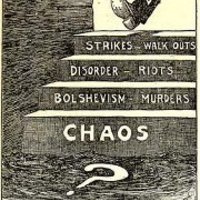Benjamin Fogel
New York University, History, Graduate Student
Research Interests:
Tracing the roots of political corruption in Brazil from Vargas to Bolsonaro reveals corruption as a political strategy that has long been woven into the fabric of Brazilian politics. Corruption is intrinsically political. These days, it... more
Tracing the roots of political corruption in Brazil from Vargas to Bolsonaro reveals corruption as a political strategy that has long been woven into the fabric of Brazilian politics. Corruption is intrinsically political. These days, it usually refers to the abuse of public office, while anti-corruption initiatives are seen in the media as more or less equivalent to 'good governance.' Corruption is almost universally regarded as a bad thing, and as a result it is exceptionally rare for a politician to embrace the label of being corrupt. Deeming those bequeathed with public power as 'corrupt' calls their legitimacy into question. Consequently, opposition to corruption is never neutral. Anti-corruption often takes the form of a particular nostalgia, based on an assumption that politics was cleaner and more ethical in the past. In effect, opposing corruption promises to rectify what is out of order, rather than proposing an alternative political vision superior to the status quo. Nowhere are the contested politics of corruption and anti-corruption clearer than in Brazil. Brazil is currently locked in a political crisis that A man protests against the imprisonment of Lula in 2018 (MIDIA NINJA/FLICKR) NACLA-rePOrT ON THe Americas | VOL. 51, NO. 2-153-#, http://dx.doi.org/ 153
Research Interests:
This essay examines the class dynamics, political rationale, and consequences of Brazil’s anti-corruption investigations and right-wing anti-corruption protests from 2013 to 2018. Since 2014, Brazil has been plunged into political crisis... more
This essay examines the class dynamics, political rationale, and consequences of Brazil’s anti-corruption investigations and right-wing anti-corruption protests from 2013 to 2018. Since 2014, Brazil has been plunged into political crisis following Dilma Rousseff’s electoral victory; this political crisis has been driven by the largest anti-corruption investigation in Brazil’s history — Lava Jato (“Car Wash”). Led by previously obscure regional judge Sérgio Moro, Lava Jato has led to the indictment of almost the entirety of Brazil’s political class for corruption and the imprisonment of leading politicians and businessmen, including former president Lula da Silva. This essay makes the case that far from being a necessary step in ending Brazil’s culture of political impunity and endemic corruption, Lava Jato has been a politically driven process launched by a faction of Brazilian capital against the Workers’ Party (PT) and the party’s allies in business.
Research Interests:
Research Interests:
Research Interests:
Research Interests:
With the election of Jair Bolsonaro, Brazil faces a bleak future, but how did such a racially diverse country elect a racist, fascist, Dictatorship enthusiast after over a decade of Left governance? This essay examines the role of... more
With the election of Jair Bolsonaro, Brazil faces a bleak future, but how did such a racially diverse country elect a racist, fascist, Dictatorship enthusiast after over a decade of Left governance? This essay examines the role of anti-corruption politics as a political strategy in Bolsonaro’s rise to power. I argue that mass anti-corruption protests against Dilma Rousseff’s government 2015 and 2016 that incubated the ‘soft coup’ that removed her from power in 2016, were vital to Bolsonaro’s rise. Moreover Bolsonaroism, can be conceived of as a politics made possible by the irresolvability of political and economic crisis under neoliberalism.
Bolsonaro in several respects a politics of permanent crisis. Anti-corruption populism has proved to be a feature of right-wing resurgence in as diverse national contexts as the United States, Italy, France and India, examining the particular case of Brazil allows for a deeper examination of crisis and populism through the lens of corruption. Drawing on the work of Antonio Gramsci, I argue that corruption and anti-corruption should be understood as political strategies utilized by the ruling class or a class faction in a conjecture where rule by consent ( winning elections) or rule by force (open military coup or repression) do not constitute viable strategies.
Bolsonaro in several respects a politics of permanent crisis. Anti-corruption populism has proved to be a feature of right-wing resurgence in as diverse national contexts as the United States, Italy, France and India, examining the particular case of Brazil allows for a deeper examination of crisis and populism through the lens of corruption. Drawing on the work of Antonio Gramsci, I argue that corruption and anti-corruption should be understood as political strategies utilized by the ruling class or a class faction in a conjecture where rule by consent ( winning elections) or rule by force (open military coup or repression) do not constitute viable strategies.
